Key takeaways:
- VPNs create a secure tunnel for anonymous internet browsing, enhancing online privacy and security.
- Choosing the right VPN involves considering speed, server variety, strong encryption, reliable customer support, pricing, and a clear privacy policy.
- Common VPN issues include connection drops and slow speeds; ensuring a reliable setup and managing bandwidth can mitigate these challenges.
- Regularly updating VPN software and selecting optimal server settings can significantly improve performance and security.
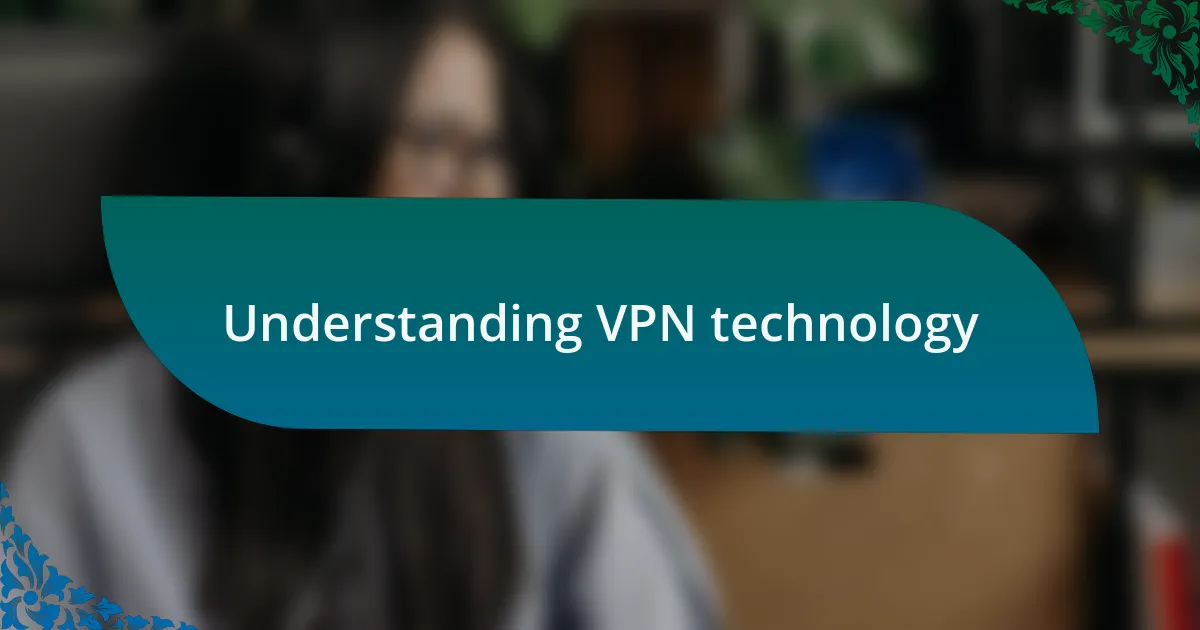
Understanding VPN technology
When I first learned about VPN technology, I was amazed by how it creates a secure tunnel over the internet, allowing users to send and receive data anonymously. It’s like having a secret passage; you can browse without leaving a trace. I often think about how important this level of privacy is in today’s digital age, especially with the countless data breaches we’ve heard about.
Using a VPN can feel like a digital shield, protecting personal information from prying eyes. I recall the first time I connected to public Wi-Fi in a café, anxious about my data security. Knowing that the VPN encrypted my connection gave me peace of mind, making me more comfortable working remotely while sipping my coffee.
Another fascinating aspect of VPNs is their ability to bypass geographic restrictions. Have you ever tried accessing content only to find it’s unavailable in your region? I had a similar experience with a streaming service while traveling. A quick VPN connection and suddenly, my favorite shows were just a click away. It’s this versatility that makes VPN technology so compelling and useful in our everyday lives.
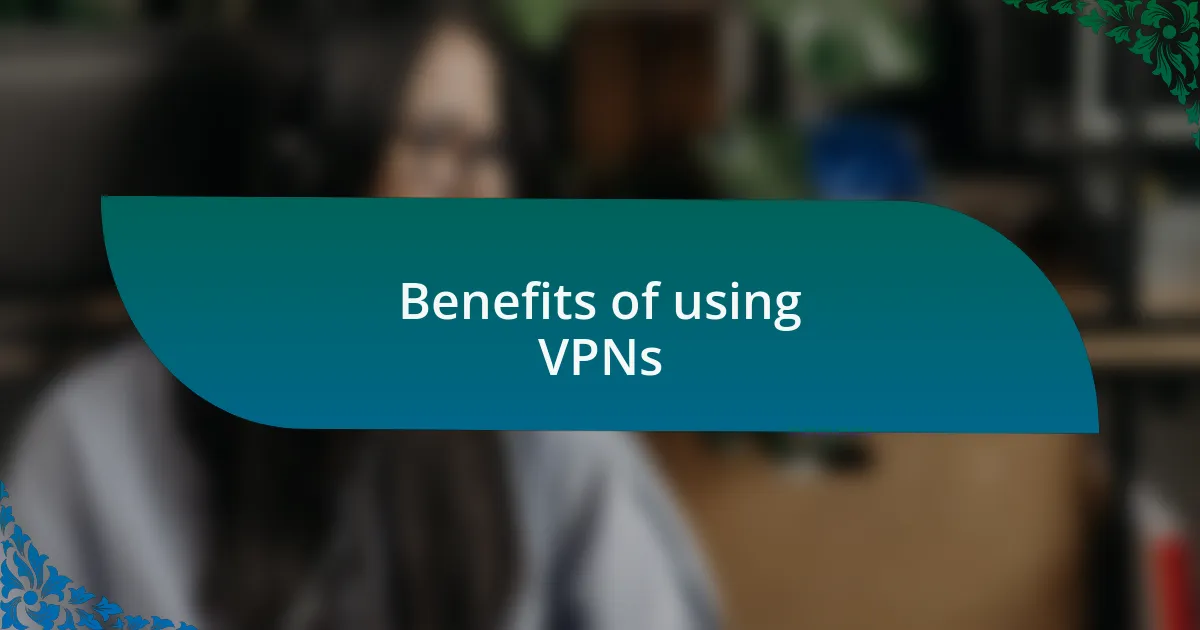
Benefits of using VPNs
Using a VPN can dramatically enhance your online security—something I realized during a recent trip abroad. I logged into my banking account while connected to a hotel Wi-Fi network, and just thinking about how vulnerable I’d be without a VPN made my stomach churn. That layer of encryption provides reassurance that my sensitive information is safe from hackers lurking on the same network.
Another benefit I’ve found is the freedom to explore the internet without limitations. I vividly remember trying to book a flight and seeing the ticket prices fluctuate based on my location. With my VPN, I switched my virtual location, and just like that, I found a significantly cheaper fare. It’s incredible how a simple toggle could bring such tangible benefits, making you feel empowered in your travel choices.
Finally, using a VPN helps me maintain my online privacy, which feels increasingly crucial in an era where companies track our online behaviors. When I first became aware of data tracking, I felt like my personal space was being invaded. By masking my IP address, I not only regain control over my online presence but also reclaim a sense of autonomy in a world that often feels overly connected. Wouldn’t you agree that it’s nice to browse knowing you have that control?
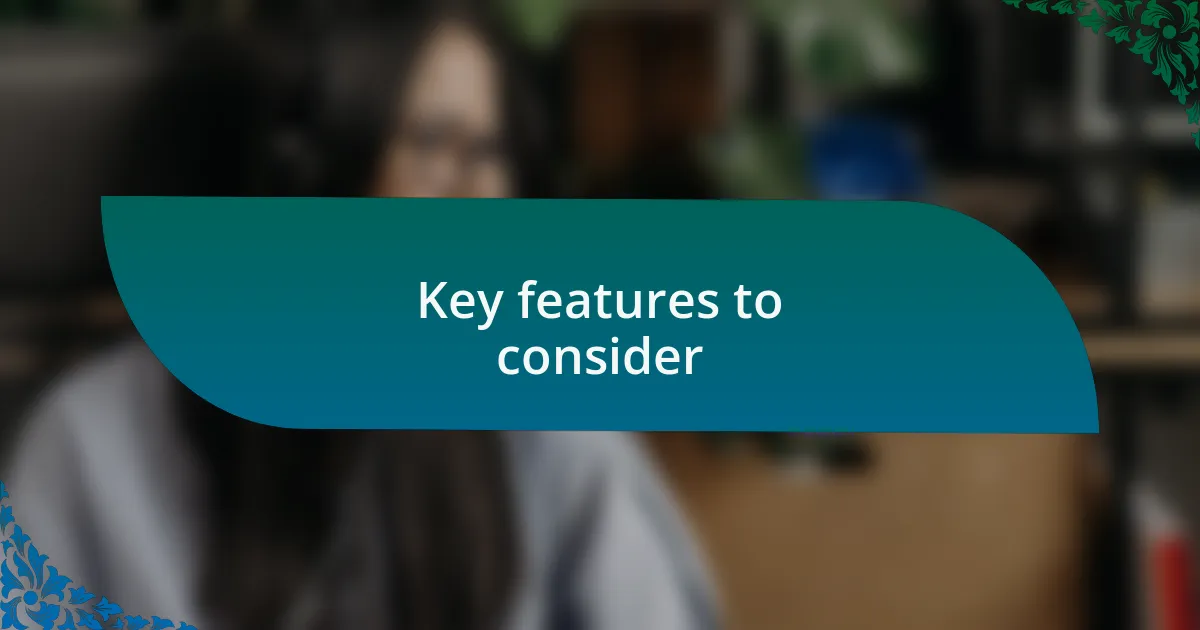
Key features to consider
When considering a VPN, one of the key features to evaluate is the speed of the connection. I remember the frustration I felt when my first VPN caused my internet to crawl. With streaming shows buffering constantly, it became a test of patience. Fast connections have since become a must-have for me, especially when it comes to enjoying uninterrupted online experiences. Why settle for less when you can have speed without sacrificing security?
Another essential feature is the variety of servers available. In my exploration, I’ve found that a greater selection of servers means more options for bypassing geo-restrictions. For instance, one time I needed access to a specific regional streaming service, and the VPN I picked had a server right in that country. I remember the relief when I could binge-watch my favorite series just when I thought I’d be out of luck! It’s moments like these that remind me how critical this feature can be.
Lastly, I prioritize strong encryption standards. The peace of mind I gain from knowing my online activities are shielded by top-notch security can’t be overstated. Early on, I made the mistake of choosing a VPN with weak encryption, which felt like leaving my front door wide open. Now, I settle for nothing less than AES-256 encryption. Isn’t it reassuring to know that your information is secured with such a robust layer of protection?
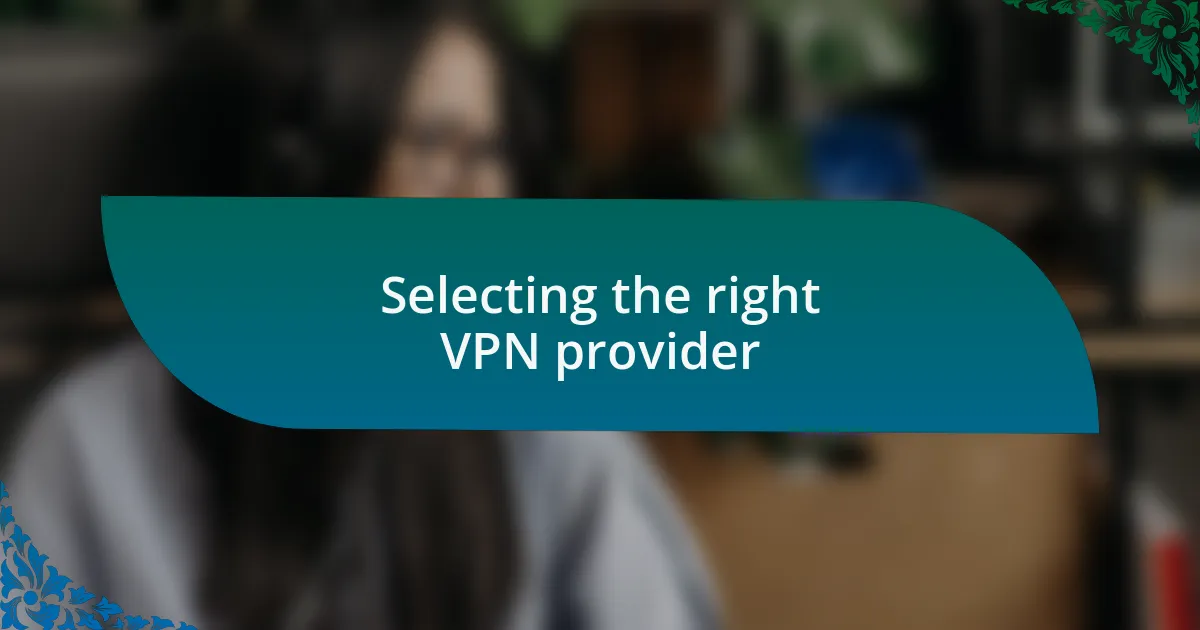
Selecting the right VPN provider
Choosing the right VPN provider involves understanding your specific needs. For me, customer support has always been a priority. I vividly recall a technical hiccup during a crucial work meeting when my VPN connection dropped. The provider’s responsive chat support had me back online in no time, and I couldn’t help but appreciate the relief of having reliable help when it mattered most. Wouldn’t you agree that having a solid support team can make or break your VPN experience?
Pricing is another critical aspect to ponder. When I first ventured into the world of VPNs, I was lured by attractive deals that turned out to be less than ideal in performance. I learned the hard way that paying a bit more often translates to better service and features. Think about it: would you rather have a budget option that constantly leaves you hanging, or a premium service that supports your online activities seamlessly?
Finally, consider the provider’s privacy policy. I remember feeling a shiver of dread when I read the fine print of a VPN’s policy stating they logged user data. That experience convinced me that transparency is vital. Make sure your chosen provider is clear about their no-log policy and fully committed to safeguarding your privacy. After all, isn’t that one of the primary reasons we seek out VPNs in the first place?
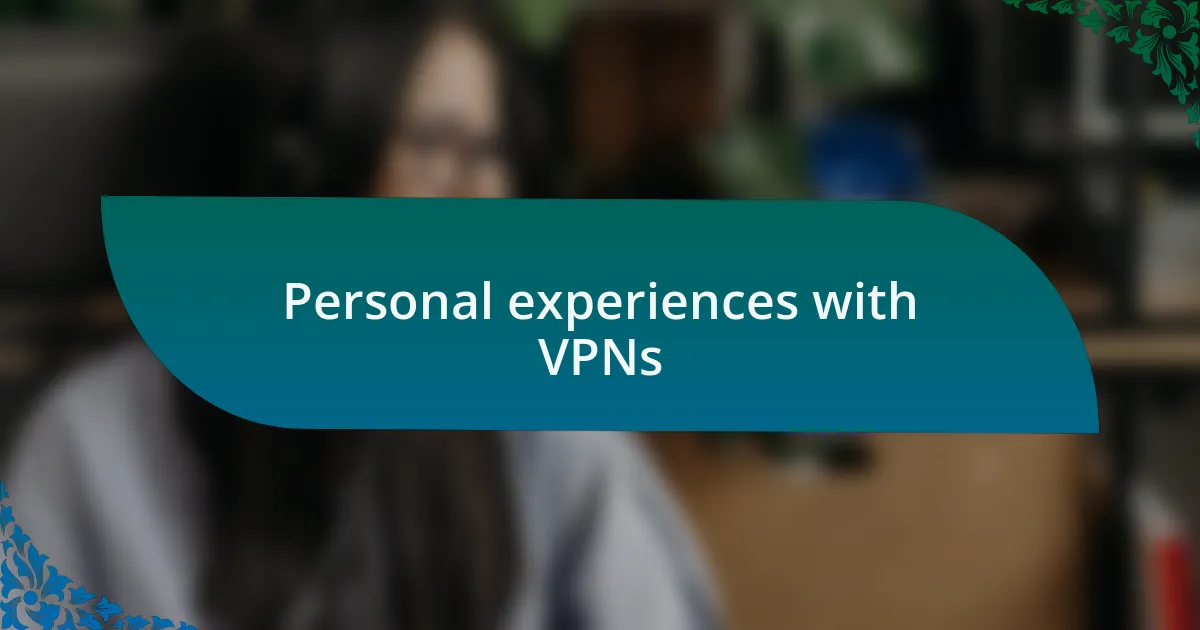
Personal experiences with VPNs
Using VPNs has profoundly impacted my online experience, particularly when I travel. I remember one trip where I wanted to access my favorite streaming services. Without my VPN, I faced frustrating restrictions that left me unable to indulge in my leisure time. When I turned on the VPN, it felt like opening a door to the digital world, bringing back the comfort of home. Have you ever felt that rush of relief when something just works?
I’ve come to realize how vital speed and reliability are when using a VPN. It was a game changer for me during my freelance work, where I relied on video conferencing. I vividly recall the moment I switched to a VPN provider that promised better speeds. The connection improved dramatically, and my meetings flowed seamlessly. Wouldn’t it be frustrating to deal with interruptions just when you need things to go smoothly?
Then there’s the issue of compatibility with various devices. At one point, I struggled to set up my VPN on my smartphone while trying to keep my laptop running simultaneously. The initial setup felt overwhelming, and I almost gave up. Thankfully, I found a user-friendly app that made it straightforward. This experience highlighted to me the importance of ease of use. Have you ever abandoned a tool simply because you couldn’t figure it out?
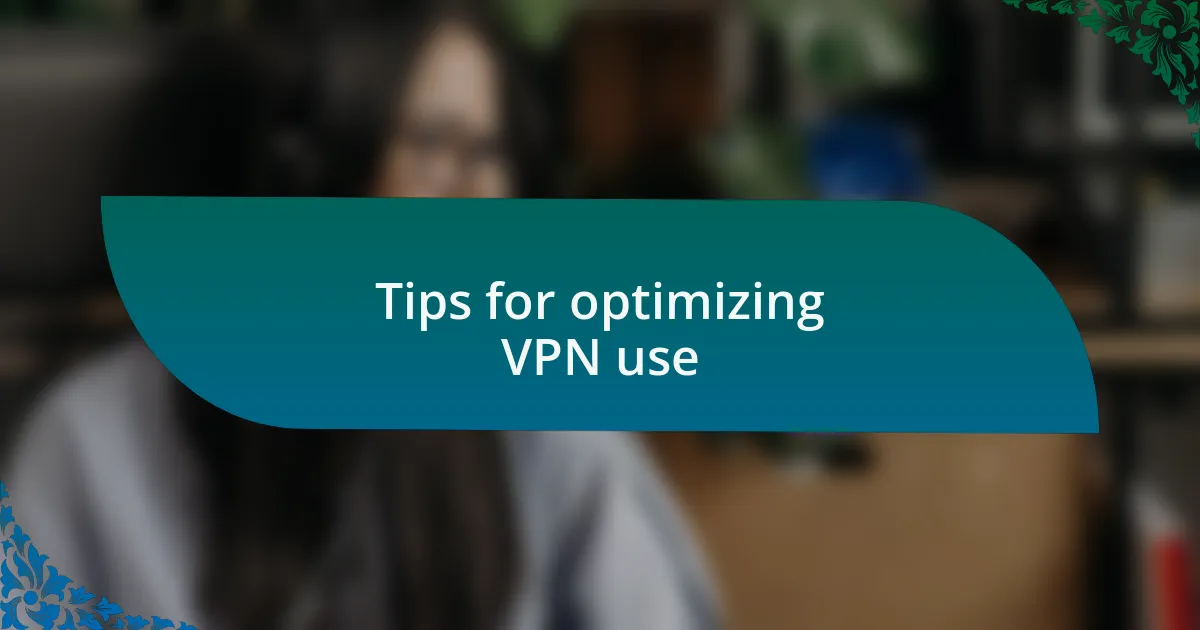
Tips for optimizing VPN use
When it comes to optimizing VPN use, one practical tip I’ve found invaluable is selecting the right server. Initially, I would often stick to the default option, assuming it was best. However, I learned that choosing a server closer to my physical location can significantly boost my connection speed. Have you ever experienced that frustrating lag during important tasks? It’s astonishing how a simple choice can completely transform your online experience.
Another strategy that has worked for me is adjusting protocol settings. At first, I had no idea what this meant, but experimenting with different protocols like OpenVPN or IKEv2 taught me a lot. Some offer better security, while others prioritize speed. I remember tweaking these settings during late-night work sessions — the difference was like switching from a sluggish highway to a smooth race track. Isn’t it incredible how a little exploration can lead to such improvements?
Lastly, I can’t stress enough the importance of regularly updating my VPN software. There was a period when I neglected updates, and vulnerabilities started to creep in. Once I made it a routine to check for updates, I felt a wave of relief knowing my data was secured. It’s like maintaining a car — consistent care prevents major breakdowns. Have you ever delayed updates, only to regret it later? Keeping your tools current is essential for a reliable and safe online experience.
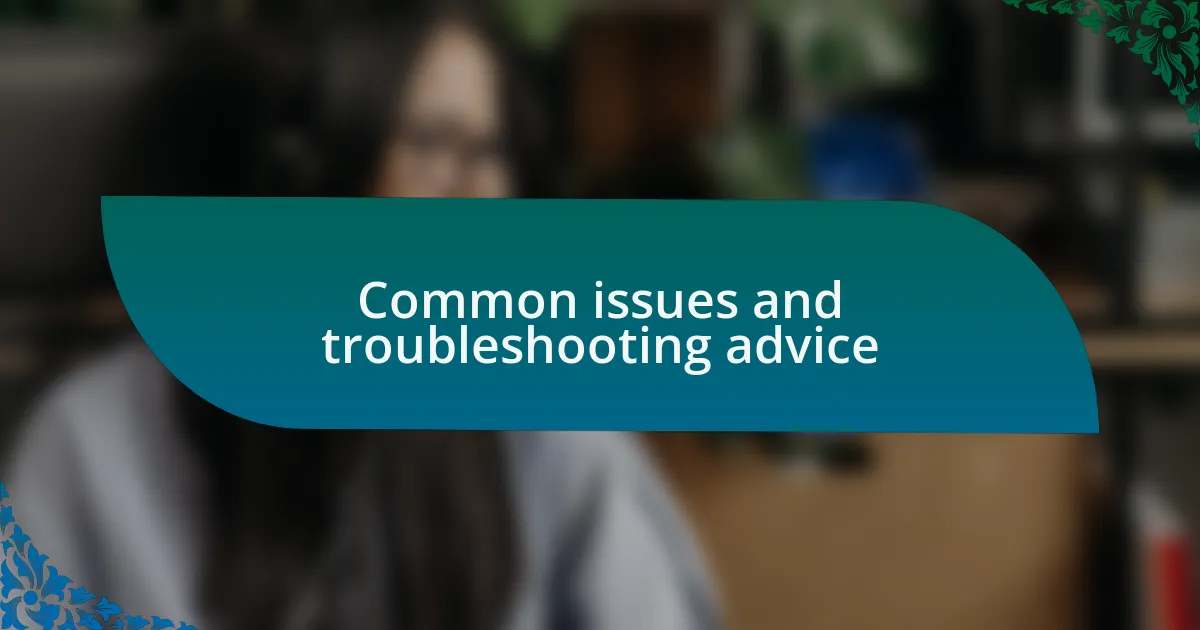
Common issues and troubleshooting advice
Common issues can arise with VPNs, and one of the most frequent challenges I’ve encountered is connection drops. I remember a particularly frustrating day when I was in the middle of a crucial video call, and the VPN decided it was a good time to disconnect. Have you ever faced that unexpected interruption? Ensuring your VPN has a reliable “kill switch” feature can help prevent exposing your real IP address during such moments, but that’s not always foolproof.
Another common issue I’ve faced is slow internet speeds, which can be exasperating. I once spent hours troubleshooting only to discover that I had a bandwidth-hogging app running in the background. It was a lesson learned — always check what else is consuming your internet resources. Have you checked your devices for any hidden culprits before assuming it’s your VPN’s fault? Sometimes the solution is simpler than you think.
Sometimes, I’ve dealt with the annoyance of device compatibility. I’ve had moments where my VPN simply refused to connect on my smartphone while it worked perfectly on my laptop. This led me to explore the specific settings or app permissions on my devices. Have you navigated these tricky waters before? It’s a reminder that understanding how technology interacts can save you hours of frustration and ensure a smoother experience.